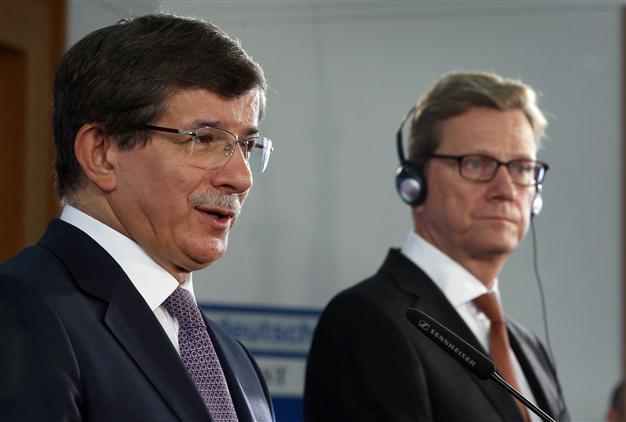Turkey recalls US 'red lines' on Syrian crisis
LONDON / BERLIN -Anadolu Agency

Turkish Foreign Minister Ahmet Davutoğlu address the media during a press conference at the foreign office in Berlin after a meeting with his German counterpart Guido Westerwelle (R) Aug. 22. Davutoğlu visited London later on the day, where he held a meeting with his British counterpart William Hague. AP photo
Turkish Foreign Minister Ahmet Davutoğlu said Aug. 22 that a "red line was crossed" in Syria, calling for international action after reports of a massacre involving chemical weapons. The phrase was an apparent reference to President Barack Obama's statement last year that chemical weapon usage represented a "red line" for the U.S.Davutoğlu visited the British and German capitals for talks, mainly to ask for Europe to increase pressure on Egypt. However, Syria topped the agenda due to the latest report of a massacre by regime forces, he stated.
"All red lines have been crossed, but still the U.N. Security Council has not even been able to take a decision. This is a responsibility for the sides who still set these red lines, and for all of us," Davutoğlu told reporters at a joint conference with his German counterpart Guido Westerwelle in Berlin.
Last year, Obama issued his "red line" to the Syrian regime, saying he would ensure that Damascus suffered "enormous consequences" if chemical weapons were used, or even if they were being prepared for deployment.
The main Syrian opposition group claims that as many as 1,300 people were killed in a chemical weapons attack on rebel areas near Damascus on Aug. 21.
Davutoğlu said the U.N. Security Council had been too hesitant in the face of the bloodletting in Syria. "If we don't manage to pass sanctions, we will lose the power to create a deterrent. If we don't act decisively, even worse massacres will follow," he said.
Phone conversation with Kerry
Speaking in London, Davutoğlu also told reporters that he had held phone discussions with U.S. Secretary of State John Kerry, upon the latter's request.
"When we started these visits, Egypt was the priority on our agenda. However, developments have made Syria an even more urgent matter. With Mr. Hague, we shared the information that we had in our hands and evaluated our perspectives," Davutoğlu told reporters after his meeting with his British counterpart.
"We tried to develop a common perspective on the policy that could be put in practice. We share the same opinions on Syria. We discussed the issue in the same way with Mr. Kerry as well," he added.
The U.N. Security Council said it was necessary to clarify an alleged chemical weapons attack in the suburbs of Damascus, but stopped short of explicitly demanding a probe by U.N. investigators in Syria.
"There is a strong concern among council members about the allegations and a general sense that there must be clarity on what happened and the situation must be followed closely," Argentina's U.N. ambassador, Maria Cristina Perceval, told reporters on Aug. 21 after a closed-door emergency meeting of the council.
While the council did not explicitly call for a U.N. investigation, it welcomed U.N. chief Ban Ki-moon's calls for one. U.N. diplomats said Russia and China opposed language containing an explicit call for a U.N. probe.
















